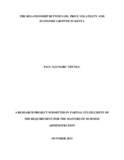| dc.description.abstract | More recently, the research emphasis has broadened to include not only the effects of changes in oil price level (mean price in a given period), but also the effects of price volatility (standard deviation in a given period) as well. The evidence confirms that volatility has a considerable influence on economic output. For example, recent US EIA estimates blamed oil price volatility between 1999 and 2001 for a loss of 0.7 percentage points of GDP growth in the U.S. economy. This translates to losses that potentially range in the tens and even hundreds of billions. This study therefore sought to establish the relationship between oil price volatility and economic growth in Kenya. This study chosen was a descriptive study since descriptive studies are more formalized and typically structured with clearly stated hypotheses or investigative questions. The study found that both economic performance and Oil Prices data were non-stationary; present observation is affected by previous observations. Partial Autocorrelation conducted by this study required that the non-stationarity data be differenced and through using a first order differencing, the time series to become stationary and eliminated misspecification in the Granger causality test, that is, all variables are stationary in their first difference forms but not in their levels. The study recommended that, since the time series become stationary and eliminated misspecification in the Granger causality test, it is highly viable that all variables in an economy be stationary in their first difference forms but not in their levels. The result of the study is a unidirectional casualty effect from OPV to GDP which contradicts with Hussain and Liew (2004) study that showed a feedback/bidirectional causal relationship between Oil Price and stock price in Malaysia; Granger, Huang and Yang (2000) found a bidirectional causal/granger relationship between the two in Asia till the Asian Financial Crisis, when the Singapore’s Oil Prices lead the price of stock. | en |

